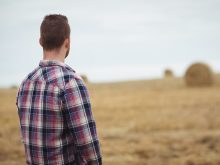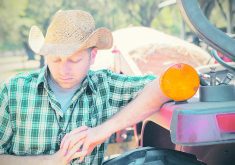“I feel as producers, we blame ourselves for things out of our control, but we don’t compartmentalize that from our success as a human,” says Cyle Stewart, rancher and mental health advocate.
Part of the battle with mental health is knowing indicators for a decline. It’s important to know what those are for an individual but general signs include:
Related story in this issue: Producer shares personal struggles
- Losing interest in hobbies and other pasttimes.
- Disconnection from loved ones and friends.
- Changes in sleeping patterns or difficulty sleeping.
- Significant changes in mood or behaviours.
- Increased use of drugs or alcohol.
- Changes in eating habits.
It can also be helpful to find someone to keep you accountable for dealing with mental health struggles. This could be a spouse or partner, close friend or family member. It’s also important to have support networks of people who will check in with you and talk to you about it.
Read Also

Producer profits remain under significant pressure
Manitoba farmers are facing down a double hit of high input costs, like fertilizer, and low grain prices as they harvest their next crop.
Stewart said that in his experience, being open and willing to talk about it himself has often opened the door to more people talking about it.
“I think we’ve been taught to suppress it and not deal with it for so long,” he said.
“But given the opportunity to share it, I think people are willing to. And seeing how much it helps has been really eye opening.”
Experiences and challenges with mental health and the strategies to deal with it should be shared just like land and livestock management practices and techniques — using open, honest discussion.
Stewart is a founding member of the SaskAg Matters mental health network, which was established with producers in mind.
At the request of producers, SaskAg Matters employs couselors with agricultural backgrounds. For anonymity, only the counselor knows the client’s name, and sessions can be over Zoom, by phone or in person.
“Even though you are the most important asset on your place, producers felt it was a poor investment of money to pay for counselling,” Stewart said of the research.
Their remedy is to provide producers with six free sessions paid for by industry and personal donations.
Other mental health networks with an agriculture focus include the Do More Agriculture Foundation on the national level, the Manitoba Farmer Wellness Program in Manitoba and AgKnow in Alberta.
Looking for help now? Check out the Do More Ag Foundation’s support page here.


















